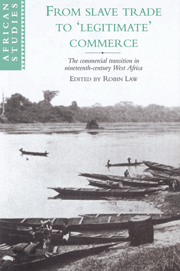 From Slave Trade to 'Legitimate' Commerce
From Slave Trade to 'Legitimate' Commerce Published online by Cambridge University Press: 21 September 2009
Like many of the other papers in the present collection, this one engages with the arguments of Tony Hopkins. Indeed, it was inspired by the experience of sitting in his Masters' class some fifteen years ago and hearing him lament the shortage of research on smallholders. In his view ‘the modern economic history of West Africa’ is in large part the history of their efforts in developing agricultural export production, efforts which were truly heroic given their limited access to capital, the ‘traditional tools’ and family labour on which they relied, and the long-standing local dominance of slave-using warriors and merchants, who continued to threaten both their peace and their profits. Given the well-documented importance of smallholders in twentieth-century West Africa, it seemed a pity that so little was known about them in the nineteenth. In particular, it was difficult to test two of Hopkins' assumptions: that free smallholder, as opposed to large-scale, slave-based, export production was significant from the start; and that the smallholder households of the nineteenth century were similar in their production techniques and social structure to their ‘modern’, mid twentieth-century counterparts.
To save this book to your Kindle, first ensure no-reply@cambridge.org is added to your Approved Personal Document E-mail List under your Personal Document Settings on the Manage Your Content and Devices page of your Amazon account. Then enter the ‘name’ part of your Kindle email address below. Find out more about saving to your Kindle.
Note you can select to save to either the @free.kindle.com or @kindle.com variations. ‘@free.kindle.com’ emails are free but can only be saved to your device when it is connected to wi-fi. ‘@kindle.com’ emails can be delivered even when you are not connected to wi-fi, but note that service fees apply.
Find out more about the Kindle Personal Document Service.
To save content items to your account, please confirm that you agree to abide by our usage policies. If this is the first time you use this feature, you will be asked to authorise Cambridge Core to connect with your account. Find out more about saving content to Dropbox.
To save content items to your account, please confirm that you agree to abide by our usage policies. If this is the first time you use this feature, you will be asked to authorise Cambridge Core to connect with your account. Find out more about saving content to Google Drive.